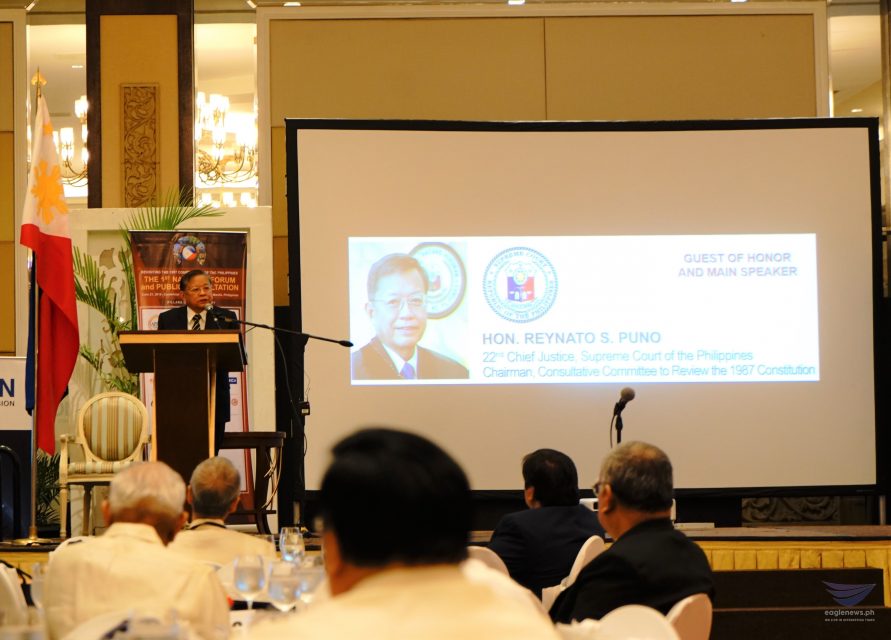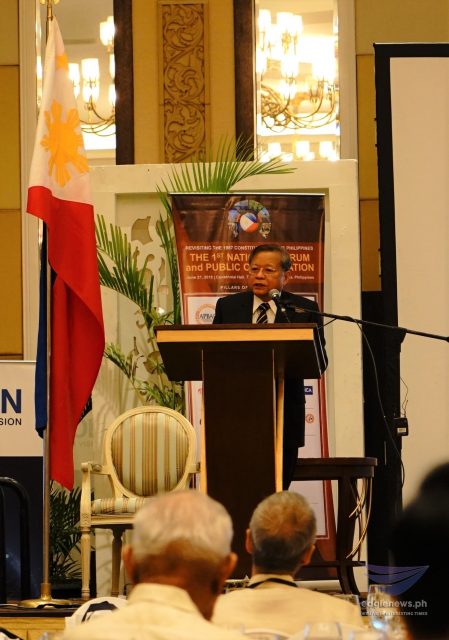No term extension for the President and Vice President after June 30, 2022; Senators to be elected per region, among other changes

(Eagle News) — The first draft of the proposed Constitution will be submitted to President Rodrigo Duterte for his review “this week or early next week” before this will be presented to Congress which will then meet as a “constituent assembly” to revise the present 1987 Constitution.
This was revealed by former Supreme Court Chief Justice Reynato Puno who chairs the Consultative Committee to Review the 1987 Constitution on Thursday, June 21, at the Manila Hotel.
In the first National Forum and Public Consultation revisiting the 1987 Constitution, Puno explained the contents of the proposed constitution that pushes “radical changes” in the Constitution to allow for a federal-presidential form of government where both the President and the Vice-President will come from one political party, among other things.
The President and the Vice-President will also have no term extensions, he added.
Under the transition period for the proposed Constitution, “there will be no term extension for the President and the Vice-president.”
“We specifically provided that the term of the president and the vice-president which shall end on June 30, 2022, shall not be extended. And we set the first national, regional, and local elections under the new constitution to be held without postponement on the second Monday of May 2022,” Puno said.

Under the proposed Constitution, senators will be elected by region, and not by national vote, in a still bicameral Congress with a Senate and a House of Representatives.
There will also be federated regions with more powers, including the power to impose taxes, but with a provision in the Constitution that will prevent them from separation from the federal government.
In essence, the proposed Constitution will make sure that development and prosperity is not concentrated in Metro Manila, but is spread out in the regions, including in Mindanao where the threat of secessionism looms large.
“What is wrong with our unitary government? What is wrong cannot escape our senses. It is the overconcentration of powers in the national government,” Puno said.
“Our government is Metro Manila-centric,” he said.
-Changes in the three branches of government-
Puno said that they have decided on a presidential form of government, in lieu of a parliamentary and semi-parliamentary form of government, as the country still has to “develop a strong political party system.”
“Hence, our federal system of government twill feature an executive, a bicameral Congress, and a judiciary,” the former Chief Justice said.
But there will be changes in these three branches of government, he noted.
Under the proposed Constitution, the President and the Vice-President will be elected by a direct vote of the people but should come from one party.
“Under the proposal, the President has to appoint the Vice-President as a member of his cabinet. In other words, the vice president will not just be spare tire,” Puno said.
Another major change is that senators will be elected by region, under a bicameral congress, and not anymore via a national vote.
-Senators to be elected per region-
“Senators will come from a federated region,” he said. “Every region will have three senators.”
This will ensure enough representation from every region, Puno said.
“This election by region will assure that every region will have senators that ought to remedy the defect of the current system where Mindanao is often unrepresented or underrepresented in the senate. This follows the political rule of equalization of the unequal,” he explained.
Membership in the House of Representatives will also undergo a major change in light of a greater number of the population.
“The House will be composed of 400 members, 60 percent of whom will be elected by the legislative districts,” while 40 percent will come from political parties “on the basis of proportional representation.”
Political parties will be given seats in proportion with the votes gathered by political parties.
The proposed constitution will also require candidates for the senate and the House of Representatives to have college degrees.







